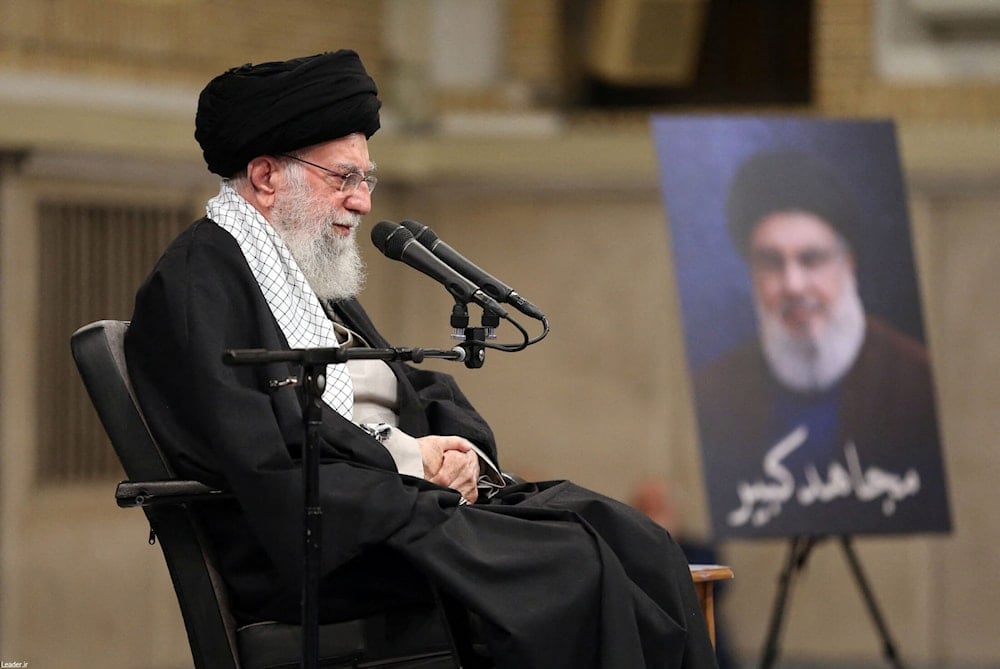Regional problems stem from US, European presence: Sayyed Khamenei
The Iranian leader says "the countries of the region can manage themselves, manage their region, live together in peace, health, and well-being."
-

This handout picture provided by the office of Iranian Leader Sayyed Ali Khamenei shows him during a gathering of Iranian top scientific talents in Tehran on October 2, 2024, with a portrait of Hezbollah's Secretary-General martyr Sayyed Hassan Nasrallah next to him. (AFP)
Regional problems are rooted in the presence of the United States and certain European countries, pointed out Sayyed Ali Khamenei, the leader of the Islamic Revolution and the Islamic Republic of Iran, describing these nations as false advocates of peace and stability.
In a meeting with a group of Iranian elites and prominent scientific figures at Imam Khomeini Hussainia on Wednesday, Sayyed Khamenei asserted that if these foreign powers were to withdraw from the region, the ongoing conflicts and war would completely end.
"The countries of the region can manage themselves, manage their region, live together in peace, health, and well-being," he added.
The Iranian leader further indicated that he will touch on the developments in Gaza and Lebanon in the near future.
On his account on X, Sayyed Ali wrote, "We are in a state of mourning these days, and personally, I feel a deep sadness. The incident that occurred was not a minor one. The loss of Sayyed Hassan Nasrallah is not a trivial matter, and it has truly placed us in a painful state of mourning."
نحن في حالة حداد هذه الأيّام، وأنا شخصيًّا ينتابني حزنٌ عميق حقًّا، فالحادث الذي وقع لم يكن حادثًا هيّنًا. إنّ فقدان السيّد حسن نصرالله ليس حادثًا هيّنًا، وقد جَعَلَنا بالفعل في حالة حداد مؤلمة.
— الإمام الخامنئي (@ar_khamenei) October 2, 2024
The Iranian leader's remarks come just a day after hundreds of Iranian missiles and projectiles filled the skies of occupied Palestine as part of Operation True Promise 2 – Iran's retaliation to the Israeli assassination of Hamas chief martyr Ismail Haniyeh, Hezbollah Secretary-General martyr Sayyed Hassan Nasrallah, and the IRGC's Deputy Commander for Operations General Abbas Nilforoushan.
At least 200 missiles were fired by the IRGC's Aerospace Force at strategic Israeli military sites, including three air bases in Tel Nof, Nevatim, and Hatzerim.
The IRGC confirmed in a statement that the missile attacks targeted "three military bases" around Tel Aviv, as well as air and radar bases, adding that "90 percent" of the missiles "hit their targets."
According to the IRGC, the Nevatim base houses the F-35 fighter jets, while the Hatzerim base houses the F-15 fighter jets that were used to assassinate martyr Sayyed Nasrallah.
#Iran carried out Operation True Promise 2, the Islamic Republic's unprecedented attack on "Israel" in retaliation against the Israeli assassinations of Ismail Haniyeh, Sayyed Hassan Nasrallah, and Nilforoushan.
— Al Mayadeen English (@MayadeenEnglish) October 2, 2024
Hundreds of ballistic missiles rained down on Israeli bases while… pic.twitter.com/rbMGPCWBf6
The statement warned that if "Israel" acts in response to Operation True Promise 2, "it will face violent consequences."
Iran's Foreign Minister Abbas Araghchi said that the country acted in self-defense under Article 51 of the United Nations Charter, affirming that "we did so after exercising tremendous restraint for almost two months, to give space for a ceasefire in Gaza."
"Our action is concluded unless Israeli regime decides to invite further retaliation," he pointed out.
"In that scenario, our response will be stronger and more powerful. Israel's enablers now have a heightened responsibility to rein in the warmongers in Tel Aviv instead of getting involved in their folly," the top diplomat underlined.
The latest attack follows Operation True Promise, during which an unprecedented drone and missile attack was launched at "Israel" from Iran in April, in response to the Israeli assassination of its officials and aggression on its embassy in Damascus.
Read more: Pezeshkian says IRGC attack on 'Israel' only part of Iran's power

 3 Min Read
3 Min Read








